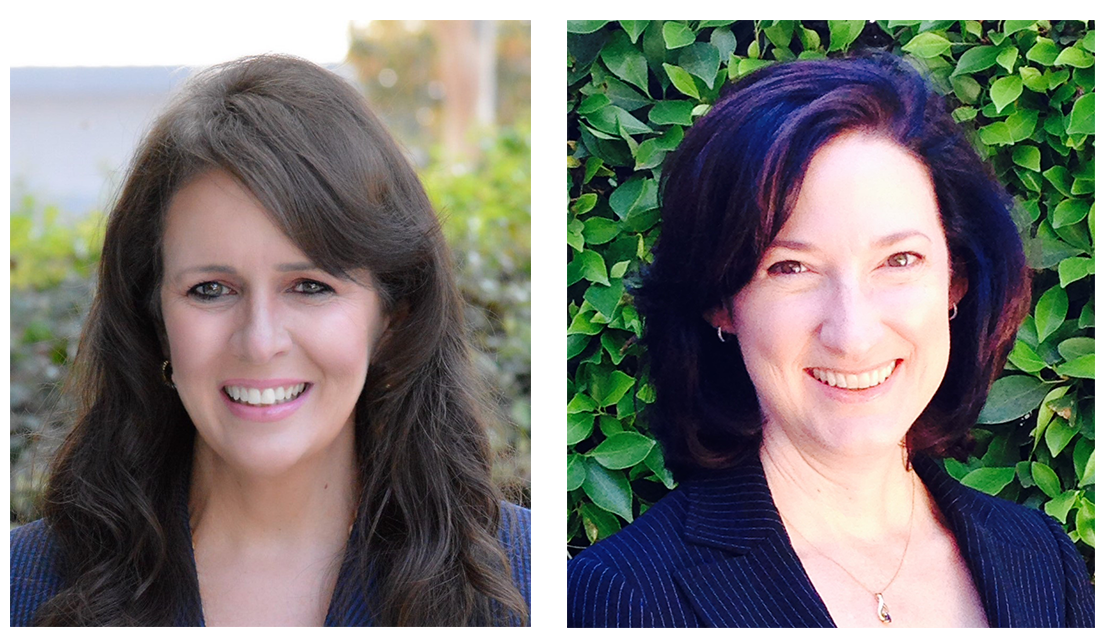Stepping into the Sunshine
Molly Murphy, CIO of the Orange County Employees Retirement System (OCERS), is about longevity as much as the $20 billion fund she oversees. Based in Santa Ana, California, OCERS is the second-largest county public pension fund in the United States and just celebrated its 75th anniversary, guided by a focus on risk management and a diverse team, driven by Murphy who assumed the role of CIO in 2017.
Murphy, who entered the industry amid the market crash in 1987, has charted her own course, crossing the industry to manage a trading desk at Fifth Third Bank, then turning a two-page investment plan into a new investment division at a municipal investment bank, Seasongood Asset Management. After most recently managing a more Sharpe ratio-focused portfolio for Mercy Health, where capital was notoriously “precious,” Murphy says she has found the figurative – and literal – sunshine, as she tells Hightree Advisors Principal and Senior Advisor Lisa Laird.

Left to right: Molly Murphy, CIO, OCERS; Lisa Laird, Principal and Senior Advisor, Hightree Advisors
LAIRD: Let’s start by talking about OCERS: the organization, how it’s positioned, and external/internal managers.
MURPHY: We have enjoyed strong cash flows for a very long time. We are contribution positive to neutral, so we are still bringing in more than we are taking out.
We have 10 to 20 years where we will be compounding AUM at a rapid pace, and right now, we’re very diversified. We are total return-focused, so we look at the return profile first, with income second in the context of risk management, and we have a little bit higher allocation to private equity than liquid alternatives.
We’ve been increasing our allocation to private equity: We were at 6%; we’re now at 13%. We’ve also introduced infrastructure as an asset category. We have been reducing our corporate credit exposure and fixed income, given where rates are, and we have been pushing that credit allocation to equity strategies. We most recently modified our strategies in April 2020 with recognition of where prices were in Covid. We moved 15% more into equity strategies to take advantage of where markets were sitting at the end of March.
LAIRD: What was the biggest surprise when you made a transition in your career from healthcare to the public funds space?
MURPHY: I had a small team in a healthcare system in the Midwest where we were always extremely careful with allocating capital. I broadly assumed that pension plans are lower-returning, but at Orange County, we’re cash-positive, total return-oriented, and we can own beta because we can look at a long-term return horizon. In healthcare, there’s always the fear of legislation changing or a big M&A deal, leaving capital with short notice to close the deal, but I don’t have to think about that anymore.
To your point, though, our board meetings are public, and I have to consider how I communicate in that forum, which I did not have to think about in the same way when I was in healthcare. Before the pandemic, we always ran under the radar when the press had to physically show up to cover our meetings, but now we are widely covered on Zoom, so everything that we do makes a headline somewhere.
LAIRD: Is there much memory of the 1994 Orange County bankruptcy caused by a derivative trade?
MURPHY: We’ve become very risk management-focused because of what happened in 1994: Four of our board members are elected from our employees’ unions, and four are appointed by the Orange County Board of Supervisors. Our county Treasurer is publicly elected. The county and business community at large remember having to go through the austerity years. OCERS, the pension system, was not part of the bankruptcy, but the County government is our largest plan sponsor, and it was a painful moment in its history.
As a result, OCERS has always had a consultant to monitor our risk management profile. But we’re getting larger and more complex, so recently, we have installed our own risk management platform. It’s one of the areas that we felt needed to be part of our in-house tool kit.
LAIRD: How are you thinking about your current team, and what is it that you’re looking to add?
MURPHY: I love that we have people with different backgrounds, education, gender, ethnicity, and language skills. We have 10 people right now. I inherited three investment professionals when I got to Orange County, which made us reliant on consultants: I appreciate consultants because they extend our reach; however, having your own team with diverse viewpoints and lived history makes us stronger. We will continue to add talent as AUM grows.
I am a big proponent of Socratic methods: My mom was a teacher, my dad was a lawyer, and we learned to debate at the dinner table: We do that internally; we also do that with our consultants once a month covering a robust pipeline of ideas. Also, I believe in succession planning, and I’m looking for people who are not afraid of their opinion, who have an inherent curiosity and are self-starters and are team oriented.
LAIRD: What advice do you have for the women who come after you? What advice would you have given yourself 20 years ago?
MURPHY: You have to believe in yourself and your skills and ability, and if you don’t, you have to work on yourself. However, I have found that some women are too hard on themselves and often carry a perfectionist burden on their shoulders when it comes to their careers. I would tell women to be willing to learn on the job. If you know 60% of the job, go for it. You’ll be as good at learning something as you are at doing something. Plus, the learning curve is the best part because trying something new is exciting.
People think of investments as a math-oriented career, but it’s a people business, and you need to network – not just to get your next job, but to do your current job well. A lot of my job is asking people in my network, “Who’s the best at this?” and “Where can I find that?” Without a network, you won’t get into hard-to-access private equity funds, and that can be a meaningful alpha difference.
My second job out of college in 1993 was at a very reputable, conservative bank: When Fifth Third Asset Management had their team meetings every Monday morning, there was an inner circle of chairs, and the less significant people took the outer circle. My father said, “If you sit in the inner circle chairs, no one’s going to ask you to move, but if you default yourself to the outer circle chairs, they’ll assume it speaks to where you’re comfortable or your ability.” You have to push yourself into rooms and conversation.
LAIRD: I had something very similar happen early in my career. Someone said to me, “Sit at the head of the table; you need to get used to it.” What is your investment philosophy?
MURPHY: Be nimble and be open. Always have enough liquidity to fund your next idea and have a willingness to look at things that you don’t know. Never say no to something completely because everything in investments is, “No” with an asterisk: It’s really, “No at this moment,” because if markets are doing X, it’s a “no”; if they’re doing Y, it’s a “yes.”
LAIRD: Let’s talk a little bit about your path.
MURPHY: My curiosity in markets started when I was nine years old. I grew up in Cincinnati, Ohio. My dad was an attorney with a banking organization advising ultra-high net worth clientele: He would read the Wall Street Journal every morning, and he taught me to read the stock tables. We started playing stock market games (We picked what we thought the Dow Jones was going to be at the end of the year), and it got me interested in investing.
Investment banking was really hot when I got out of college, and I thought that would be my path; then the market cratered, and I ended up at Fidelity Investments. I had more of a fixed income focus, so in 1993 – after four years at Fidelity – I joined a fixed income trading desk, which I managed in the investment division of Fifth Third Bank in Cincinnati. Then, while I was finishing my MBA and CFA designation, I moved into the fund management team in the fixed income space.
Most people who work inside a bank get to the place where they love their job, but they don’t want to work with the bureaucracy and the rules that surround banks. After seven years, I was sitting at a crossroads. I knew a private investment bank also in Cincinnati, Seasongood & Mayer, that did municipal bond underwriting in Ohio and Kentucky. I thought they needed an investment arm, so I pitched them a plan, and within a few weeks, we set up a whole division at this company. I was CIO for a few years until I got the itch again to do something different.
Four years later, in 2004, Catholic Healthcare Partners (also in Cincinnati, Ohio) was looking for a Director of Investments. (This was when healthcares didn’t have CIOs.) The company was located right down the street in Cincinnati, but I thought, “Who in the heck is Catholic Healthcare Partners?” They operated under a different, local brand, so I had never heard of them. I started looking at the company, and I said, “Maybe they need my investment management services.” On a whim, I put my resume in through the job search function, and three weeks later, I had a new job.
I eventually was named their first CIO and stayed through their rebranding to Mercy Health, until my services were no longer needed in 2016. Twelve years after having left Seasongood, I was at another crossroads. I had some time to contemplate what I wanted for my next chapter, and I wrote down, “What would my perfect job look like?”
Six months into my journey, I woke up to a grey, snowy day in Ohio, and in my emails, there was an article about Orange County starting its search for its next CIO. I had written off public pension funds, but I thought, “Don’t they have sunshine in Orange County?” I put my resume in, and the rest is history: I ended up moving across the country, I have sunshine every day, and it’s the best decision I ever made.
Coming back to what I would say to women: Twice or three times, I was at a place where I’ve been let go or things were changing, when I wasn’t in control and there was a lot of consternation, shame, and stress. We women are such planners, and when things don’t go as planned, we might feel it’s a failure on our part. This is when that belief in yourself and your skills is critical. We need to roll with things; I needed to find a place that was a fit for me where I have longevity. My career path has been anything but a straight line. It has been more serendipitous than planned. To keep searching for it can be stressful, but if you think about it, it’s not the destination; it’s the ride: You have to have an appreciation for that, or that basket of emotions can overwhelm you.
To discuss the content of this article, further engage with the author(s), or gain access to like content Join The Conversation Here if you are a member of the group, or Request Membership

